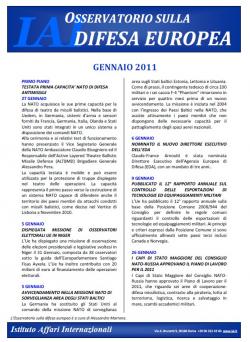Observatory on European defence, November 2001

19-20 November 2001
Meeting EU GAC and Defence Ministers – Second Capability Conference
The EU General Affairs Council and the Ministers of Defence met in Brussels to progress in establishing the European Rapid Reaction Force.
The final document adopted at the end of the “Capability Improvement Conference” confirms the efforts and the additional national contributions made in order to have the force operational as soon as possible, but at the same time underlines persistent shortcomings and connected risks.
The following capability areas require intervention: logistics, force projection, land force mobility, naval air force, health care, precision munitions, CSAR (Combat Search and Rescue), strategic capabilities (intelligence, communications, command, surveillance), air and sea strategic lift.
The final document refers to the need to improve the quality of the force and increase the level of international cooperation in different areas, such as procurement, logistic, training and international staff.
The governments approved an Action Plan to coordinate national efforts, making them more efficient and effective and facilitating cooperation and increasing support from public opinion.
The process of capability improvement will be based on further national contributions, efficiency gains from present assets and, possibly, common production, financing, management and use of future capabilities.
The Military Committee is in charge of the Action Plan, that could develop on different “tables”, under the leadership of one or more “leading countries”.
European Ministers agreed on the need to strengthen the technological and industrial defence base, through the harmonisation of military requirements and procurement planning.
The budgetary implications of the improvement in military capabilities required to conduct “Petersberg” operations autonomously, were not addressed.
Turkish opposition (strengthened by Europe’s position on Cyprus) is still blocking access to NATO capabilities.
Moreover, a common agreement on the creation of a formal Defence Council has not been reached.
The second EU military capability Conference is an important event for achieving ESDP.
The need for a common European security policy has been underlined by the most recent international events.
The road to operational capability is still long, as stated in the final document, but there seems to be the political to support the process.
An effort to speed up the process and give European defence initiatives adequate founds is urgently needed. A declaratory policy would be dangerous; it would generate high short-term expectations, without acquiring the necessary tools to act in the short run.
From the structural point of view, the leading country system may have to be integrated in a wider communitarian framework.
It is clear that such a process will require different levels of cooperation between countries that will not always necessarily include all 15 EU members.
19 November 2001
Meeting EU GAC and Internal Affairs Ministers – International Police Capabilities
The General Affairs Council, with the participation of the Ministers for Internal Affairs, approved the final document of the “Police Capability Commitment Conference”. European countries have committed themselves to building an International Police Force for foreign intervention by 2003.
The commitment taken on in the European Councils of Feira and Göteborg, concerning a force of 5,000 men, 1,000 (now 1,400) of them deployable within 30 days, has now been respected.
The police forces will also be of a military type (Carabinieri, Gendarmerie,…); the national contributions are as follows:
| COUNTRY | FORCE | deployable within 30 days |
| Italy | 971 | 242 |
| Germany | 910 | 90 |
| France | 810 | 300 |
| Spain | 500 | 300 |
| United Kingdom | 450 | 40 |
| Portugal | 250 | 200 |
| Greece | 180 | 20 |
| Sweden | 170 | 50 |
| Netherlands | 133 | 20 |
| Belgium | 130 | 100 |
| Denmark | 125 | 25 |
| Austria | 110 | 20 |
| Eire | 80 | 80 |
| Finland | 75 | 15 |
| Luxemburg | 6 | 1 |
19 November 2001
Military Programs – ETAP
Defence Ministers of six European countries (Italy, France, Germany, United Kingdom, Spain and Sweden), reached an agreement on a common program named ETAP, European Technology Acquisition Programme, during the EU Military Capability Conference held in Brussels.
The project is aimed at studying and demonstrating the enabling technologies for a European capability in future air combat systems.
Major European defence industries, like EADS, Dassault, BAe Systems, SAAB and Finmeccanica are involved in the program.
This initiative by major European countries enhancing the credibility of European defence policy, both on the industrial and political side, comes after a period in which numerous doubts and obstacles were raised on the issue.
The need for a European aeronautic industry program has become even more urgent after the recent development of the American JSF project to build a multirole strike fighter (the F-35 by Lockheed Martin).
The decision to pursue enabling technologies, instead of developing a specific platform, is an interesting innovation with respect to traditional multinational procurement programs.
The sustainability of the European industrial structure within the next 20-30 years will be increasingly dependent on European governments’ ability to reach an agreement. A common policy should facilitate the reshaping of the European defence industry, needed to maintain the technological and production capability needed to uphold the political and military integration process.
-
Details
Roma, Istituto affari internazionali, 2001 -
Issue
01/11


